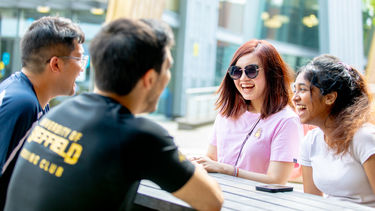The course not only provided me with the skills needed to apply for the job, but also to interview successfully.

Why did you decide to study this course?
I used to hate it when people asked me what I wanted to be when I grew up because, like lots of other people, I didn’t know yet. I did English Language at undergrad because I liked that it was broad, meaning I could go down whichever path I choose. I then chose to study with the Digital Humanities Institute because the course, although still broad, offered me a new set of skills on top of those I learnt in my undergraduate degree.
How did you use the skills from your English Language degree in the course?
I was able to take the analytical skills I’d learnt from my English Language degree and apply them to digital data methodology. I don’t think people realise how many skills you gain from a humanities degree. It’s not just reading books if you study English or looking at maps if you study Geography. In my undergraduate degree, I did a module in corpus linguistics, which is using software and data to analyse language. There was also a module on using the corpus to analyse language in my MA course where I looked at how language in the online sphere affects people socially. Although this is a direct link, it really doesn’t matter what your undergraduate degree was in, it’s all about the application of knowledge you learnt in your undergrad. That’s why the course attracts a really broad range of people and skills - all the friends I’ve made from the course studied something different at undergrad.
What do you like most about your course and the subjects you study?
I like that this course has real world connections and I can see how the topics I am studying are relevant to business and society. The subjects that are covered are wide ranging and this gives the foundation to then be able to be creative in the projects and assessments that are set; specifically, after learning about sentiment analysis and the theories related to identity and culture, I was able to devise an e-portfolio topic that really interests me, but also makes use of knowledge from across multiple modules. I looked at how dementia was represented by comparing how it was spoken about by people living with it compared to in the media. As part of the course we’d discussed different perspectives within the online sphere, and having been personally affected by dementia, I decided to combine the two. I guess it is the mixture of creativity and facts that makes this course both challenging and exciting.
What attracted you to the University of Sheffield?
I chose Sheffield, for it has a respectable reputation in both student experience and teaching, but also, I like that teaching goes beyond the classroom and can be applied to the real world. I personally am interested in research and that is what Sheffield is known for, so it felt like the right fit for me. Sheffield is also known for its vibrant student culture, so I was excited to be a part of that community.
What is it like to be a PG student in the DHI?
Being part of the DHI means you are instantly exposed to the wide-ranging research that is going on. This is useful as it gives you opportunity to see where your MA could take you and how to apply the skills you’re learning. For me, it has been useful being part of the DHI as it exemplifies how academics from various backgrounds can come together to complete projects that are bringing technology to the arts and humanities. The DHI also offers unique opportunities to meet people from the digital sector through Business Leader Talks.
How has your Masters helped you with your new job?
I now work for a rail freight company as an Assistant Account Manager. The course not only provided me with the skills needed to apply for the job, but also to interview successfully. As the course involved presentations, when I had to present as part of my interview I was confident and the panel was impressed with how I came across. The technical skills I gained have also been invaluable - I worked with different software systems in Masterclasses, for example, in one class I learnt how to visually represent data in a map. I use these skills every day in my job as I use Excel a lot and I am able to process large data sets and put them into reports.
What do you like most about living in Sheffield?
I was a bit nervous about studying at a new University, especially as I was only going to be there for a year. But Sheffield is very student orientated and it was easy to meet people and I soon felt that I belonged. Everyone is very friendly and there is always something happening, whether that is to do with the university or the wider city.
Do you have any advice for students thinking about studying this course at Sheffield?
Go for it. Sheffield has been the best choice for me in my MA as I am constantly being challenged, but also supported to ensure I reach my potential.

International Merit Scholarships
We offer a generous package of financial support for international students including 75 undergraduate scholarships worth £10,000 towards the annual tuition fee and 125 postgraduate taught scholarships worth £5,000 towards the tuition fee. Applications are now open for existing offer holders.

